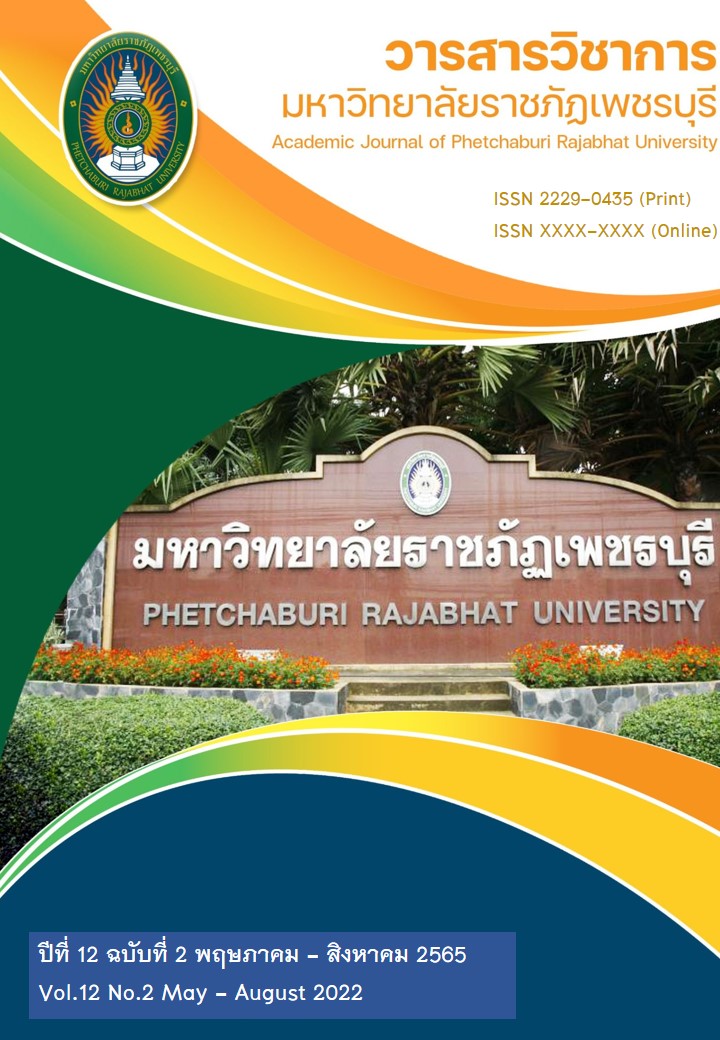แนวทางการส่งเสริมการจัดการสุขภาพตนเองของผู้ป่วยโรคเบาหวานในสถานการณ์ การแพร่ระบาดของโควิด-19 สำหรับเจ้าหน้าที่สาธารณสุข
Main Article Content
บทคัดย่อ
การแพร่ระบาดของโควิด-19 ส่งผลต่อระบบบริการสุขภาพทั่วโลก เนื่องจากจำเป็นต้องจำกัดการเข้าถึงบริการสุขภาพตามมาตรการปิดเมืองหรือการเว้นระยะห่างระหว่างบุคคล ส่งผลให้ประชาชนที่เจ็บป่วยด้วยโรคไม่ติดต่อเรื้อรัง โดยเฉพาะอย่างยิ่งผู้ป่วยโรคเบาหวานไม่สามารถเข้ารับการรักษาติดตามอาการอย่างต่อเนื่องได้ตามปกติ จากเหตุผลดังกล่าวจึงอาจทำให้ผู้ป่วยได้รับผลกระทบโดยตรงต่อการควบคุมระดับน้ำตาลในกระแสเลือดในระยะยาวซึ่งอาจก่อให้เกิดภาวะแทรกซ้อนจากโรคเบาหวานในอนาคตได้ บทความนี้จึงมีวัตถุประสงค์เพื่อนำเสนอแนวทางปฏิบัติเจ้าหน้าที่สาธารณสุขในการส่งเสริมการจัดการสุขภาพตนเองที่เหมาะสม ได้แก่ การเจาะตรวจหาระดับน้ำตาลในเลือดด้วยตนเอง การรับประทานอาหาร และการออกกำลังกาย เพื่อช่วยให้ผู้ป่วยโรคเบาหวานสามารถควบคุมระดับน้ำตาลในเลือดได้อย่างมีประสิทธิภาพท่ามกลางการแพร่ระบาดของโควิด-19
Article Details

อนุญาตภายใต้เงื่อนไข Creative Commons Attribution-NonCommercial-NoDerivatives 4.0 International License.
บทความนี้ยังไม่เคยลงตีพิมพ์ในวารสารใดมาก่อน และไม่อยู่ระหว่างการพิจารณาของวารสารอื่น
บทความที่ลงพิมพ์เป็นข้อคิดเห็น/แนวคิด/ทัศนคติของผู้เขียนเท่านั้น หากเกิดผลทางกฎหมายใดๆที่อาจ
เกิดขึ้นจากบทความนี้ ผู้เขียนจะเป็นผู้รับผิดชอบ และบทความนี้เป็นลิขสิทธิ์ของวารสารเท่านั้น
เอกสารอ้างอิง
International Diabetes Federation. IDF Diabetes Atlas - 2019. International Diabetes Federation: 2019. 1–144 p.
Leelawattana R, Pratipanawatr T, Bunnag P, Kosachunhanun N, Suwanwalaikorn S, Krittiyawong S, et al. Thailand Diabetes Registry Project: Prevalence of vascular complications in long-standing type 2 diabetes. J Med Assoc Thail. 2006; Aug;89 Suppl 1:S54-9. PMID: 17717878.
Aschner P. New IDF clinical practice recommendations for managing type 2 diabetes in primary care. Diabetes Research and Clinical Practice; 2017.
Choeisuwan V. Health Literacy : Concept and Application for Nursing Practice. R Thai Navy Med J 2017;44(3):183–97.
Cefalu W. Self-Monitoring of Blood Glucose in Noninsulin-Using Type 2 Diabetic Patients. Diabetes Care. 2013; Jan;36(1):176-8. doi: 10.2337/dc12-0831. PMID: 23264289; PMCID: PMC3526213.
Chueahor K, Arayajaru P. The Essential Roles of Nurse Practitioners to Promote Self-monitoring Blood Glucose of Thais Diagnosed with Type 2 Diabetes Mellitus in Sub-district Health Promotional Hospitals by U sing the 4M ’ s Concept. R Thai Navy Med J 2021;48(2):447–57.
Kirk JK, Stegner J. Self-monitoring of blood glucose: Practical aspects. J Diabetes Sci Technol. 2010;4(2):435–9.
Jiang X, Wang J, Lu Y, Jiang H, Li M. Self-efficacy-focused education in persons with diabetes: A systematic review and meta-analysis. Psychology Research and Behavior Management 2019;12: 67–79.
American Diabetes Association. Glycemic Targets: Standards of Medical Care in Diabetes—2019. Diabetes Care [Internet]. 2019 Jan;42(Supplement 1):S61–70. Available from: http://care.diabetesjournals.org/lookup/doi/10.2337/dc19-S006
Bukhsh A, Goh BH, Zimbudzi E, Lo C, Zoungas S, Chan KG, et al. Type 2 Diabetes Patients’ Perspectives, Experiences, and Barriers Toward Diabetes-Related Self-Care: A Qualitative Study From Pakistan. Front Endocrinol (Lausanne) 2020;11(November):1–13.
Vetrani C, Calabrese I, Di Rienzo S, Pagliuca M, Rivieccio A, De Angelis R, et al. Dietary Changes During COVID-19 Lockdown in Adults With Type 1 Diabetes on a Hybrid Artificial Pancreas. Front Public Heal. 2021;9(October):1–7.
Cuschieri S, Grech S. COVID-19 and diabetes: The why, the what and the how. J Diabetes Complications [Internet]. 2020;34(9):107637. Available from: https://doi.org/10.1016/j.jdiacomp.2020.107637
Mahluji S, Jalili M, Ostadrahimi A, Hallajzadeh J, Ebrahimzadeh-Attari V, Saghafi-Asl M. Nutritional management of diabetes mellitus during the pandemic of COVID-19: a comprehensive narrative review. J Diabetes Metab Disord. 2021;20(1):963–72.
Forde R, Arente L, Ausili D, De Backer K, Due-Christensen M, Epps A, et al. The impact of the COVID-19 pandemic on people with diabetes and diabetes services: A pan-European survey of diabetes specialist nurses undertaken by the Foundation of European Nurses in Diabetes survey consortium. Diabet Med 2021;38(5):1–10.
Grady PA, Gough LL. Self-management: A comprehensive approach to management of chronic conditions. Am J Public Health. 2018;108(8):S430–6.


